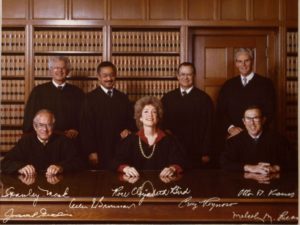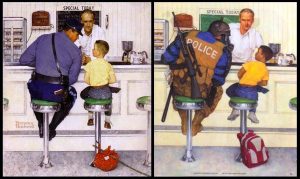
Cal. Penal Code Section 422 – Criminal Threats, is one of the few crimes in California that criminalizes speech. The Rose Bird Court held the predecessor California California Section 422 statute, that was then called “Terrorist Threats”. The California Supreme held that the California “Terrorist Threats Statute” was “Void for Vagueness” because the statute criminalize threats of harm made for “political” or societal gain”.
When the old 422 Statute got tossed, California went looking for guidance on what type of speech can be criminalized by the state. The found that answer in a case out of the United States Court of Appeals for the Second Circuit in United States v. Kelner, 534 F.2d 1020 (2nd Cir. 1976)
Under United States v. Kelner to be the type of threat that the state can criminalize it must meet the following criterion to pass first amendment scrutiny:
“So long as the threat on its face and in the circumstances in which it is made is so unequivocal, unconditional, immediate and specific as to the person threatened, as to convey a gravity of purpose and imminent prospect of execution, the statute may properly be applied.”
Following Kelner, California adopted the present Cal. Penal Code Section 422 statute that provides:
(a) Any person who willfully threatens to commit a crime which will result in death or great bodily injury to another person, with the specific intent that the statement, made verbally, in writing, or by means of an electronic communication device, is to be taken as a threat, even if there is no intent of actually carrying it out, which, on its face and under the circumstances in which it is made,
Is so unequivocal, unconditional, immediate, and specific as to convey to the person threatened, a gravity of purpose and an immediate prospect of execution of the threat, and thereby causes that person reasonably to be in sustained fear for his or her own safety or for his or her immediate family’s safety, shall be punished by imprisonment in the county jail not to exceed one year, or by imprisonment in the state prison.
(b) For purposes of this section, “immediate family” means any spouse, whether by marriage or not, parent, child, any person related by consanguinity or affinity within the second degree, or any other person who regularly resides in the household, or who, within the prior six months, regularly resided in the household.
(c) “Electronic communication device” includes, but is not limited to, telephones, cellular telephones, computers, video recorders, fax machines, or pagers. “Electronic communication” has the same meaning as the term defined in Subsection 12 of Section 2510 of Title 18 of the United States Code.
If you are the victim of bogus allegations of violation of Cal. Penal Code Section 422, we can help you.

Jerry L. Steering, Law Office of Jerry L. Steering, 4063 Birch Street, Suite 100, Newport Beach, CA 92660; (949) 474-1849; jerrysteering@yahoo.com






